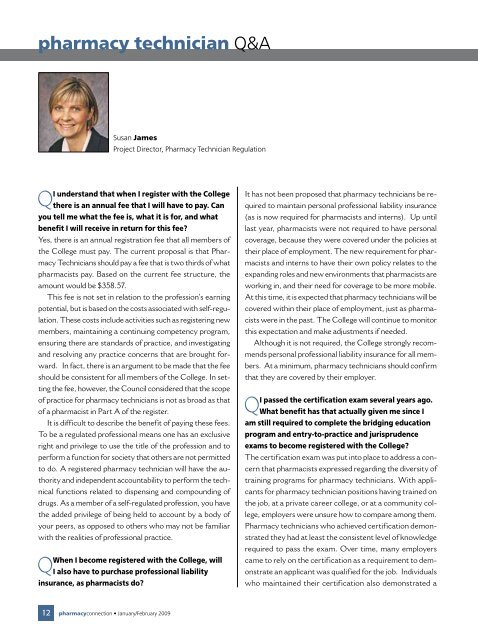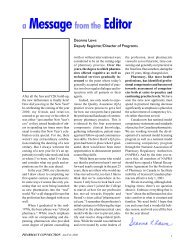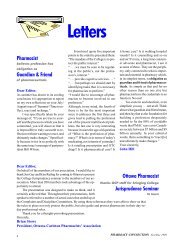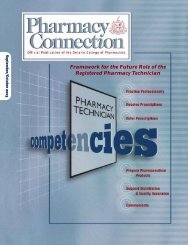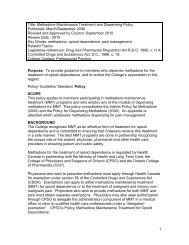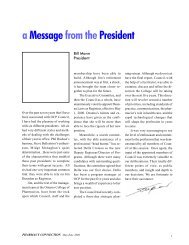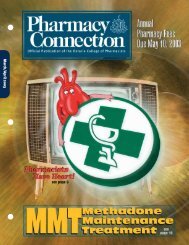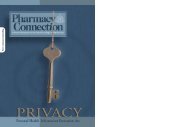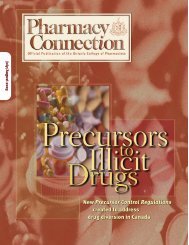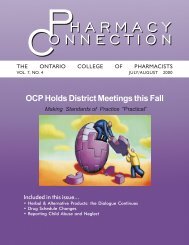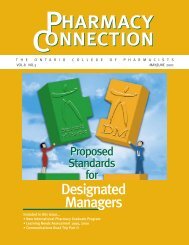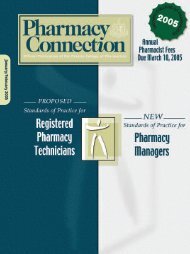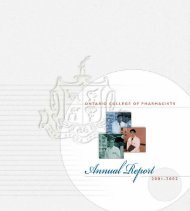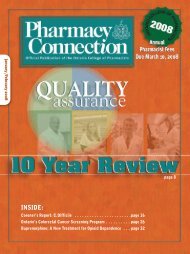January/February 2009 - Ontario College of Pharmacists
January/February 2009 - Ontario College of Pharmacists
January/February 2009 - Ontario College of Pharmacists
You also want an ePaper? Increase the reach of your titles
YUMPU automatically turns print PDFs into web optimized ePapers that Google loves.
pharmacy technician Q&A<br />
Susan James<br />
Project Director, Pharmacy Technician Regulation<br />
QI understand that when I register with the <strong>College</strong><br />
there is an annual fee that I will have to pay. Can<br />
you tell me what the fee is, what it is for, and what<br />
benefit I will receive in return for this fee?<br />
Yes, there is an annual registration fee that all members <strong>of</strong><br />
the <strong>College</strong> must pay. The current proposal is that Pharmacy<br />
Technicians should pay a fee that is two thirds <strong>of</strong> what<br />
pharmacists pay. Based on the current fee structure, the<br />
amount would be $358.57.<br />
This fee is not set in relation to the pr<strong>of</strong>ession’s earning<br />
potential, but is based on the costs associated with self-regulation.<br />
These costs include activities such as registering new<br />
members, maintaining a continuing competency program,<br />
ensuring there are standards <strong>of</strong> practice, and investigating<br />
and resolving any practice concerns that are brought forward.<br />
In fact, there is an argument to be made that the fee<br />
should be consistent for all members <strong>of</strong> the <strong>College</strong>. In setting<br />
the fee, however, the Council considered that the scope<br />
<strong>of</strong> practice for pharmacy technicians is not as broad as that<br />
<strong>of</strong> a pharmacist in Part A <strong>of</strong> the register.<br />
It is difficult to describe the benefit <strong>of</strong> paying these fees.<br />
To be a regulated pr<strong>of</strong>essional means one has an exclusive<br />
right and privilege to use the title <strong>of</strong> the pr<strong>of</strong>ession and to<br />
perform a function for society that others are not permitted<br />
to do. A registered pharmacy technician will have the authority<br />
and independent accountability to perform the technical<br />
functions related to dispensing and compounding <strong>of</strong><br />
drugs. As a member <strong>of</strong> a self-regulated pr<strong>of</strong>ession, you have<br />
the added privilege <strong>of</strong> being held to account by a body <strong>of</strong><br />
your peers, as opposed to others who may not be familiar<br />
with the realities <strong>of</strong> pr<strong>of</strong>essional practice.<br />
QWhen I become registered with the <strong>College</strong>, will<br />
I also have to purchase pr<strong>of</strong>essional liability<br />
insurance, as pharmacists do?<br />
It has not been proposed that pharmacy technicians be required<br />
to maintain personal pr<strong>of</strong>essional liability insurance<br />
(as is now required for pharmacists and interns). Up until<br />
last year, pharmacists were not required to have personal<br />
coverage, because they were covered under the policies at<br />
their place <strong>of</strong> employment. The new requirement for pharmacists<br />
and interns to have their own policy relates to the<br />
expanding roles and new environments that pharmacists are<br />
working in, and their need for coverage to be more mobile.<br />
At this time, it is expected that pharmacy technicians will be<br />
covered within their place <strong>of</strong> employment, just as pharmacists<br />
were in the past. The <strong>College</strong> will continue to monitor<br />
this expectation and make adjustments if needed.<br />
Although it is not required, the <strong>College</strong> strongly recommends<br />
personal pr<strong>of</strong>essional liability insurance for all members.<br />
At a minimum, pharmacy technicians should confirm<br />
that they are covered by their employer.<br />
QI passed the certification exam several years ago.<br />
What benefit has that actually given me since I<br />
am still required to complete the bridging education<br />
program and entry-to-practice and jurisprudence<br />
exams to become registered with the <strong>College</strong>?<br />
The certification exam was put into place to address a concern<br />
that pharmacists expressed regarding the diversity <strong>of</strong><br />
training programs for pharmacy technicians. With applicants<br />
for pharmacy technician positions having trained on<br />
the job, at a private career college, or at a community college,<br />
employers were unsure how to compare among them.<br />
Pharmacy technicians who achieved certification demonstrated<br />
they had at least the consistent level <strong>of</strong> knowledge<br />
required to pass the exam. Over time, many employers<br />
came to rely on the certification as a requirement to demonstrate<br />
an applicant was qualified for the job. Individuals<br />
who maintained their certification also demonstrated a<br />
12 pharmacyconnection • <strong>January</strong>/<strong>February</strong> <strong>2009</strong>


